
Elio Di Rupo is a Belgian politician who has served as the minister-president of Wallonia since 2019. He is affiliated with the Socialist Party. Di Rupo previously served as the prime minister of Belgium from 6 December 2011 to 11 October 2014, heading the Di Rupo Government. He was the first francophone to hold the office since Paul Vanden Boeynants in 1979, and the country's first socialist prime minister since Edmond Leburton left office in 1974. Di Rupo was also Belgium's first prime minister of non-Belgian descent, and the world's second openly gay person and first openly gay man to be head of government in modern times.
On 13 June 2004, regional elections were held in Belgium, to choose representatives in the regional councils of the Flemish Parliament, the Walloon Parliament, the Brussels Parliament and the German-speaking Community of Belgium. The elections were held on the same day as the European elections.
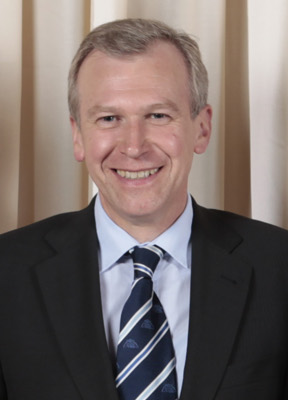
Yves Camille Désiré Leterme is a Belgian politician, a leader of the Christian Democratic and Flemish party (CD&V). He was the prime minister of Belgium, from November 2009 to December 2011.

Laurette A. J. Onkelinx is a Belgian politician from the Francophone Socialist Party. She was the Deputy Prime Minister – Minister of Social Affairs and Public Health in the Belgian federal government, i.e., the Di Rupo Government, which took office on 6 December 2011.
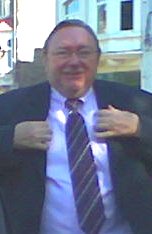
Jean-Claude Van Cauwenberghe, nicknamed "Van Cau", is a Belgian politician. He is member of the Parti Socialiste. He was the tenth Minister-President of Wallonia from 4 April 2000 until 30 September 2005. He resigned amid the ICDI affair and was replaced by Elio Di Rupo. He also served as mayor of Charleroi (1983-2000).

Federal elections were held in Belgium on 10 June 2007. Voters went to the polls in order to elect new members for the Chamber of Representatives and Senate.

Paul Magnette is a Belgian politician. Since 2019, he is the leader of the Socialist Party, social democratic French-speaking party in Belgium. Since 2012, he is also mayor of Charleroi. At academic level, he is a former political science professor at the Free University of Brussels (ULB) and Director of the Institute of European Studies of the ULB. He was appointed minister in the Belgian federal government from 2007 to 2013 and was Minister-President of Wallonia from 2014 to 2017. He also was a member of the Senate of Belgium, of the Parliament of Wallonia and of the Parliament of the French Community.
The 2007–2008 Belgian government formation followed the general election of 10 June 2007, and comprised a period of negotiation in which the Flemish parties Flemish Liberal Democratic, Christian Democratic and Flemish (CD&V) and New Flemish Alliance (N-VA), and the French-speaking parties Reformist Movement (MR), Democratic Front of Francophones (FDF) and Humanist Democratic Centre (CdH) negotiated to form a government coalition. The negotiations were characterized by the disagreement between the Dutch- and French-speaking parties about the need for and nature of a constitutional reform. According to some, this political conflict could have led to a partition of Belgium.
The partition of Belgium is a hypothetical situation, which has been discussed by both Belgian and international media, envisioning a split of Belgium along linguistic divisions, with the Flemish Community (Flanders) and the French-speaking Community (Wallonia) becoming independent states. Alternatively, it is hypothesized that Flanders could join the Netherlands and Wallonia could join France.
The 2007–2011 Belgian political crisis was a period of tense communal relations and political instability in Belgium, which was rooted in the differing opinions on state reform, and in the continued existence of the controversial electoral district of Brussels-Halle-Vilvoorde (BHV). Parties from the Dutch-speaking Flemish Community are in general strongly in favour for a devolution of powers to the communities and regions, and the splitting of the unconstitutional BHV district, while French-speaking French Community of Belgium is generally in favour of retaining the status quo. After the 2010 elections, the topics of public debt, deficit cuts and socio-economic reform were added to the debate, with most Flemish parties in favour of finding money by strongly reducing spending, whilst the proposals supported by most French-speaking parties also included a significant raise in taxes. The crisis came to an end in December 2011 with the inauguration of a new federal government which agreed on partition of the BHV district and on policies aimed at tackling the economic downturn. The country's continuing linguistic divide played a large part in the crisis. Several times during the period Belgium was threatened to be split up amid rising Flemish separatism.
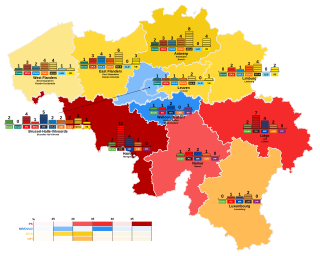
Federal elections were held in Belgium on 13 June 2010, during the midst of the 2007-11 Belgian political crisis. After the fall of the previous Leterme II Government over the withdrawal of Open Flemish Liberals and Democrats from the government the King dissolved the legislature and called new elections. The New Flemish Alliance, led by Bart De Wever, emerged as the plurality party with 27 seats, just one more than the francophone Socialist Party, led by Elio Di Rupo, which was the largest party in the Wallonia region and Brussels. It took a world record 541 days until a government was formed, resulting in a government led by Di Rupo.
Following the Belgian general election held on 13 June 2010, a process of cabinet formation started in Belgium. The election produced a very fragmented political landscape, with 11 parties elected to the Chamber of Representatives, none of which won more than 20% of the seats. The Flemish-Nationalist New Flemish Alliance (N-VA), the largest party in Flanders and the country as a whole, controlled 27 of 150 seats in the lower chamber. The Francophone Socialist Party (PS), the largest in Wallonia, controlled 26 seats. Cabinet negotiations continued for a long time. On 1 June 2011, Belgium matched the record for time taken to form a new democratic government after an election, at 353 days, held until then by Cambodia in 2003–2004. On 11 October 2011, the final agreement for institutional reform was presented to the media. A government coalition was named on 5 December 2011 and sworn in after a total of 541 days of negotiations and formation on 6 December 2011, and 589 days without an elected government with Elio Di Rupo named Prime Minister of the Di Rupo I Government.

The Di Rupo Government was the federal cabinet of Belgium sworn in on 6 December 2011, after a record-breaking 541 days of negotiations following the June 2010 elections. The government included social democrats (sp.a/PS), Christian democrats (CD&V/cdH) and liberals, respectively of the Dutch and French language groups. The government notably excluded the New Flemish Alliance (N-VA), the Flemish nationalist party which achieved a plurality and became the largest party. Its absence, together with the unwillingness of Open Vld to enter into an eight-party coalition that included the green parties, caused the government coalition to lack a majority in the Dutch language group. It was the first time that the Belgian prime minister had been openly gay, as Di Rupo became the world's first male openly gay head of government. Elio Di Rupo also became the first native French-speaking prime minister since 1979 and the first prime minister from Wallonia since 1974 and first socialist prime minister since 1974.
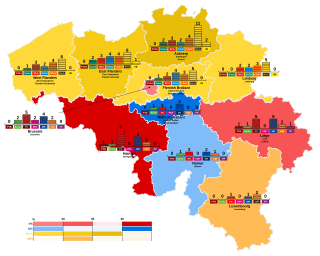
Federal elections were held in Belgium on 25 May 2014. All 150 members of the Chamber of Representatives were elected, whereas the Senate was no longer directly elected following the 2011–2012 state reform. These were the first elections held under King Philippe's reign.
Following the simultaneous federal elections and regional elections of 25 May 2014, negotiations started to form a new Federal Government as well as new regional governments: a Flemish, Walloon, French Community and Brussels Government. A Government of the German-speaking Community was formed only a few days after the elections.
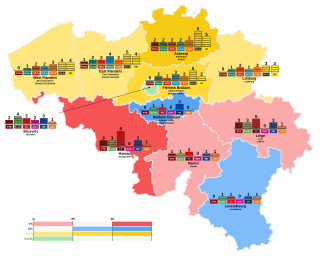
Federal elections were held in Belgium on 26 May 2019, alongside the country's European and regional elections. All 150 members of the Chamber of Representatives were elected from eleven multi-member constituencies.
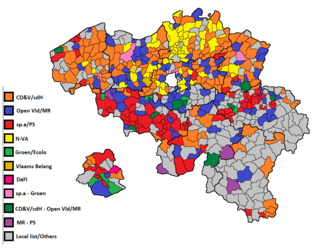
The Belgian provincial, municipal and district elections of 2018 took place on Sunday 14 October 2018. They are organised by the respective regions:

Ahmed Laaouej is a Belgian politician. He is a member of the Belgian Chamber of Representatives elected through the Parti Socialiste. He is the mayor of the commune of Koekelberg and Head of the PS parliamentary group in the House of Representatives.















